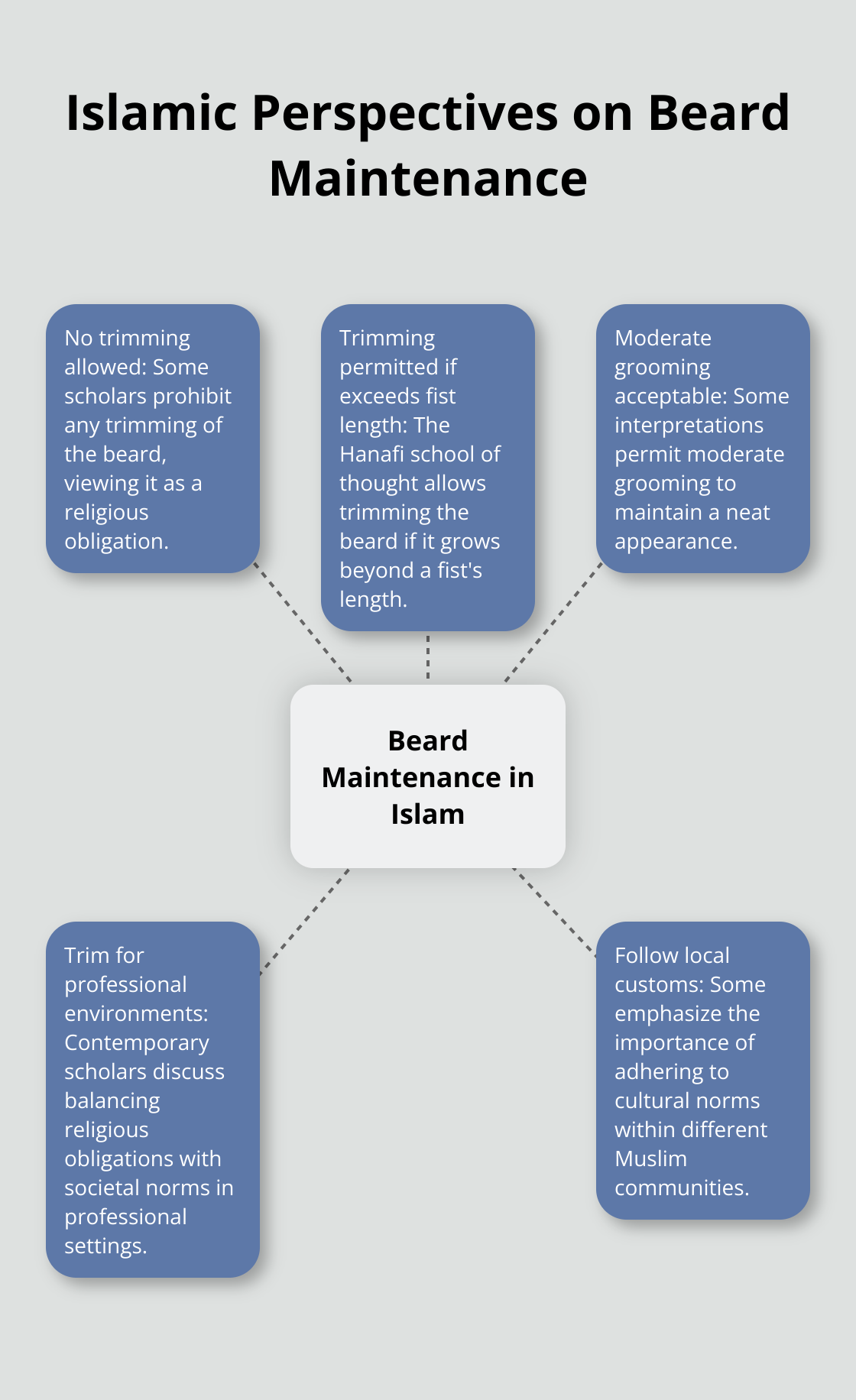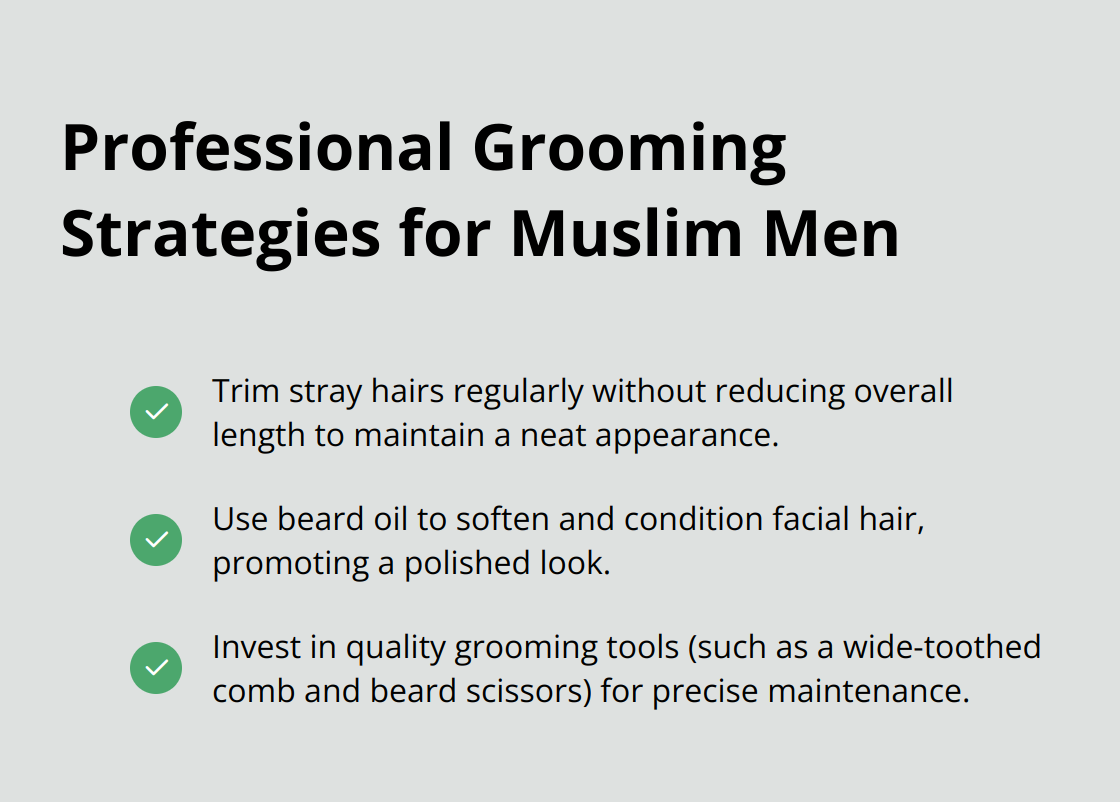Is It Haram to Trim Your Beard? Religious Perspectives
At Barber Craft, we often encounter questions about religious perspectives on grooming practices. One common inquiry we receive is, “Is it haram to trim your beard?”
This topic sparks diverse opinions within the Muslim community, reflecting various interpretations of Islamic teachings. In this blog post, we’ll explore different viewpoints on beard maintenance in Islam, providing insights to help Muslim men navigate this aspect of their faith and grooming routine.
The Significance of Beards in Islamic Tradition
Religious Roots of Beard Maintenance
In Islam, beards hold profound religious and cultural importance. Many Muslim men grow beards to follow the Sunnah (practices of Prophet Muhammad). This tradition stems from Islamic teachings and has sparked discussions among scholars for centuries.
Quranic Guidance and Prophetic Traditions
The Quran doesn’t explicitly mention beard maintenance, but several Hadiths (sayings and actions attributed to Prophet Muhammad) emphasize its importance. A widely cited Hadith from Sahih al-Bukhari states, “Trim the mustaches and let the beard grow; be different from the polytheists.” This Hadith leads many Muslims to view beard growth as a religious obligation.
Diverse Scholarly Interpretations
Islamic scholars debate the exact requirements for beard maintenance. Some prohibit any trimming, while others allow moderate grooming. The Hanafi school of thought permits trimming the beard if it exceeds a fist’s length. These varying interpretations reflect the complexity of this religious practice.

Modern Challenges and Adaptations
Today’s professional environments present challenges for some Muslim men in maintaining long beards. This situation has prompted contemporary scholars to discuss how to balance religious obligations with societal norms.
Respecting Individual Choices
The debate on beard maintenance in Islam continues to evolve. While some adhere strictly to traditional interpretations, others adopt more flexible approaches. This diversity in practice reflects the rich tapestry of Islamic thought and the personal nature of religious observance. As we explore the practical aspects of beard maintenance, it’s essential to consider how different Muslim men navigate these religious and cultural expectations in their daily lives.
Beard Trimming Practices Across Islamic Cultures
Islamic cultures exhibit a wide range of beard trimming practices, reflecting diverse interpretations of religious texts and local customs. These variations highlight the complex interplay between faith, tradition, and personal grooming choices.
Acceptable Beard Lengths
The debate on acceptable beard lengths continues within Islamic scholarship. Early Muslims trimmed their beards, and there is not an unequivocal text that establishes a fixed legal limit to length and size. This provides flexibility for many Muslim men who seek to balance religious observance with grooming preferences.
In contrast, some scholars advocate for leaving the beard untrimmed, citing hadiths that emphasize natural growth. However, these interpretations don’t receive universal acceptance, and many Muslims opt for moderate grooming practices.
Trimming vs. Shaving
A clear distinction exists between trimming and shaving in Islamic beard practices. While trimming often receives acceptance within certain limits, most Islamic scholars discourage or prohibit complete shaving of the beard.
Precise trimming services (which respect religious guidelines while maintaining a neat appearance) have become increasingly popular among Muslim men who wish to adhere to their faith while presenting a well-groomed image.
Cultural Variations
Beard maintenance practices differ significantly across Muslim communities worldwide. In some Middle Eastern countries, full, untrimmed beards are common and culturally expected. In contrast, many Southeast Asian Muslim communities tend to favor shorter, well-groomed beards.
Western Muslim communities often navigate a balance between religious observance and professional expectations. An increasing trend among Muslim men in urban areas (such as San Diego) shows a preference for styles that maintain religious integrity while fitting into diverse workplace environments.
Personal Interpretation and Choice
These cultural variations underscore the importance of personal choice and interpretation in beard maintenance. While religious texts provide guidance, individual Muslims ultimately decide how to apply these teachings in their daily lives.
Many Muslim men find themselves weighing various factors when deciding on their beard maintenance routine. These factors may include:

The diversity in beard trimming practices across Islamic cultures demonstrates the rich tapestry of Muslim traditions and the ongoing dialogue between faith and modern life. As we move forward, we’ll explore the practical considerations that Muslim men face when maintaining their beards in various social and professional contexts.
Navigating Beard Maintenance in Modern Life
Professional Grooming Strategies
Muslim men face unique challenges when maintaining their beards in diverse professional environments. A Pew Research Center study reveals that the vast majority of U.S. Muslims embrace both the “Muslim” and “American” parts of their identity, underscoring the importance of balancing religious principles with workplace expectations.
To achieve this balance, consider these practical tips:

Beard Health and Hygiene
Proper hygiene plays a vital role in maintaining a healthy, attractive beard. Follow these guidelines:
- Wash your beard 2-3 times a week with a gentle, beard-specific shampoo to prevent itchiness and flakiness.
- Apply beard oil daily to moisturize both the hair and the skin underneath, reducing irritation.
- Use a wide-toothed comb to detangle your beard, which stimulates blood flow and promotes healthier growth.
Addressing Common Beard Concerns
Many men experience challenges with beard growth and appearance. Here are some solutions:
- Patchy growth: Allow several months for a full beard to develop. In the meantime, keep the beard trimmed to a uniform length to minimize the appearance of patches.
- Itchiness: This often occurs in the early stages of growth. Regular washing and moisturizing can significantly reduce discomfort.
- Curly or unruly hair: Apply a small amount of beard balm to tame flyaways and achieve a neater appearance.
Expert Guidance for Religious Grooming
For personalized advice on maintaining your beard while respecting religious guidelines, consult with experienced barbers who understand cultural and religious grooming practices. Skilled professionals can provide tailored recommendations to help you achieve a well-groomed look that aligns with your faith and personal style.
Balancing Tradition and Modern Practices
Finding the right balance between religious observance and modern grooming practices is a personal journey. Implement these practical tips and seek expert guidance to maintain a beard that reflects your faith while meeting the demands of contemporary life. Islamic views on beard trimming vary, with some scholars advocating for untrimmed beards while others permit moderate grooming, unless advised by a doctor for health issues.
Final Thoughts
The question “Is it haram to trim your beard?” lacks a simple answer. Islamic scholars offer diverse perspectives on beard maintenance, reflecting the rich tapestry of Muslim traditions and interpretations of religious texts. Some advocate for untrimmed beards, while others permit moderate grooming within certain limits.
This diversity in viewpoints emphasizes the importance of personal interpretation and individual choice in religious practice. Muslim men must navigate their own path, balancing religious obligations with professional requirements and personal grooming preferences. Consulting trusted religious leaders can provide valuable guidance in making these decisions.
At Barber Craft, we understand the significance of beard maintenance in Islamic tradition. Our experienced barbers offer personalized grooming services that respect religious guidelines while helping you achieve a well-groomed appearance. Whether you choose to maintain a full beard or opt for moderate trimming, we support your grooming needs with expertise and cultural sensitivity.



